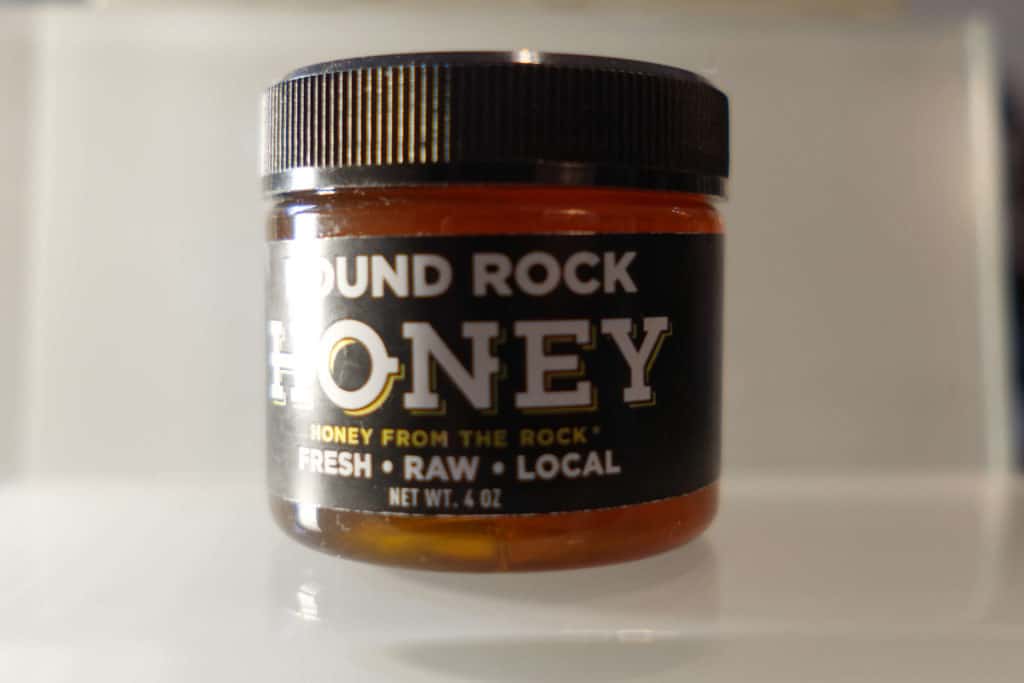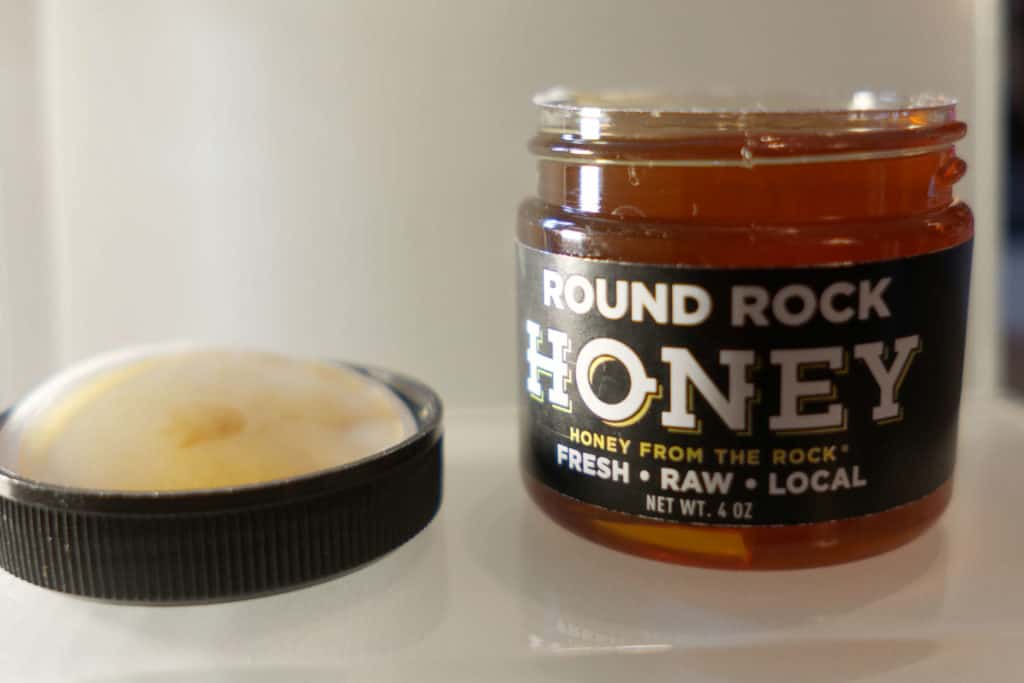Round Rock Fresh Raw Local Honey has a special place in my heart. Not because of their company, product or even the Honey itself. It holds meaning that reaches back a few years ago, before I started The Honey Review.
Round Rock Honey is one of the first products I received back when I told my Uncle Doug about my excitement for starting thehoneyreview. It’s one of the first Honey products I tested and researched. I’ve had it several times since then, how well has it been favored in my opinion?
“Honey From the Rock”
Read below for my review of Round Rock Fresh Raw Local Honey.
Round Rock Fresh Raw Local Honey Review

- Honey: Its Wildflower, Clover, Common.
- Color: Light, Filtered Golden Tan.
- Aroma: Mild Floral Notes, Subtle Oak and Nuttiness.
- Flavor: Very Sweet, Buttery, Slight Acidity.
- Texture: Very Smooth, High-Tech Filtration, Not Gummy.
If you’re native to the Austin Area, chances are you’ve seen Round Rock Honey before. It’s commonly available at HEB and most Farmers Markets. They source from over 90 various sites across Texas with thousands of Hives statewide. While this is not local Honey by my standards, it is local by State (However Texas is enormous). Round Rock Honey does bottle Honey locally on Site for HEB, and is very active with Farmers Markets. But who knows where that Honey comes from or whose it is?
The Owners Konrad and Elizabeth Bouffard started with just 4 Hives in Austin. Now they run a commercial operation with a physical store and web store.
There are Beekeeping Classes, Tours, Soaps and Skincare products, and most recently Christmas Trees? In fact, their Beekeeping school is one of the largest in Texas. These guys like to educate, and I’m cool with that.
Round Rock Honey sells Beekeeping Supplies and Nucs as well for new or existing Beekeepers.
They’ve been promoting Tours of their Facility in Round Rock since 2014. Availability of Factory Tours has dwindled since the Pandemic in 2020. But you may be able to book one or two every month.
They are $5 per person. Keep in mind this is just a factory tour with no live hives, just a demonstration of beekeeping practices and the manufacturing of Honey. I always appreciate companies that allow customers to check out the factories to give you a glimpse of how it’s made. Hershey has been doing this for decades, and my favorite, Ben & Jerry’s in Vermont.

In a way, I’d compare Round Rock Honey to Kelley’s Local Texas Honey. It’s local of Texas state, but not neighboring local or county local. Making them commercial and bordering a Honey Packer. They’ve expanded into another sister label called Goodbees as well, which is the same product, with a different name. Wine companies do this all the time. It’s so they can expand marketing through a different name, while funneling the profits into the same entity. And I’d say if you’re selling well at HEB, you know how to market. Maybe it has something to do with Taxes, I’m not sure.
The prices are definitely on the expensive side. Almost at $1 per lb. Comparing Round Rock Honey to Kelley’s Local Texas Honey at HEB, you’ll find that Round Rock Honey charges $7 for 8oz or $9.11 for 16 oz. Kelley’s, however, charges $4.68 for 12 oz or $7.91 for 24 oz. I’d say you get what you pay for in this case. To an extent… Even Kirkland Honey at Costco just states its Local Texas Honey and that’s a 3lb jar for $8.99!
Effective Marketing leads to sales, it also educates potential Customers.
Round Rock Honey has very clear and concise wording on their product line. It encourages those that should know important details like the processing treatment. Round Rock Honey states they don’t heavily filter or heat their Honey. They pull frames of uncapped Honey from a big Centrifuge at room temp. Because I’m a beekeeper, I know this is the proper treatment, however many consumers don’t.
If you read about the product on HEB’s website, Round Rock has a lot of updated and direct information. There’s a lot of copy and paste with the same statement being made multiple times even on their own website. I guess that’s something they really want to emphasize though.
Producing wildflower honey is difficult, and yields unpredictable, but in the opinion of Round Rock Honey owners Konrad and Elizabeth Bouffard, it is more important to focus on quality than on quantity! The emphasis on quality at Round Rock Honey extends to the harvest and packaging as well. Honey is “robbed” on a regular basis (season & weather permitting), and promptly bottled. Although all our honey is poured through a stainless-steel sieve to remove bee legs and wings as well as wax caps, it is never heated or filtered. We remove honey from the hives by centrifuge, at room temperature. This is done so that pollen, trace minerals, and complex sugars that occur naturally in our honey are never compromised.
– ROund Rock Honey – HEB Product Page
I appreciate they use their names, proper terminology, and why. This all reflects why they advocate for Tours so often and promote their beekeeping school. This is awesome. Kelley’s, however, their description is adequate, but not as informative.
Kelley Honey Farms products are 100% U.S.A. We are proud to provide our consumers with all-natural raw products, harvested completely in the United States of America. Our Texas bees produce honey from all regions of Texas including Greenville, McKinney, Weatherford, Lubbock, Pleasanton, Edinburg, Liberty and Chicota. Moving 14,000 hives to the best nectar flows across Texas produces Kelley Honey Farms over 1,000,000 pounds of honey per year.
Kelley’s LOcal Texas Honey – HEB Product Page
Kelley’s drives the point of being a USA product and not imported, which is fair, we get a ton of imported Honey. And they state the counties at which they harvest their Honey. It’s more than Round Rocks I’d assume as Kelley’s has 3 different brands under the same name, and a much lower retail price. Round Rock doesn’t even bother to state counties, so that’s nice of Kelley’s.
Now this is just a comparison of two local Texas Honey suppliers, but its a good point to make in how different they are with some similarities. I thought Kelley’s branding was very misleading in my initial review. They didn’t have an active social media, they are missing important details on their labeling, they don’t offer tours or schools, and have several brands that somehow offer the same exact product for questionably low prices.
I like the core of what Round Rock Honey is trying to resemble, but unfortunately, I’d still say they’re a commercial Honey Packer selling the idea of Raw Local Honey to those who don’t really know much about Honey or Bees.
Misleading, but not a terrible product. That being said, as much as I want to love their Honey, I don’t love their prices or that they don’t sell local Honey. It’s overwhelmingly misleading with these Honey producers with commercial factories. In fact, I’ve never bought my own bottle of Round Rock Honey, it’s always been gifts. But free Honey is always sweet.

Round Rock Fresh Raw Local Honey
Summary
It’s real Honey, It’s Texas based. It’s rather generic, being only wildflower. They have a wide range of products though. Orange Cinnamon Honey, Bourbon Barrel, which I may try in the future. They offer factory tours, hive tours, classes, and even had enough overhead to do groupon offers. They provide educational information on their products.
Round Rock Honey has become a product of commercial Honey Packers and promote their Honey at 6 Texas Farmers Markets. It’s hard to source how local this Honey is, but Texas is enough for people.
I’d buy it over an import Honey from Brazil, but I’d look elsewhere for local Texas Honey.